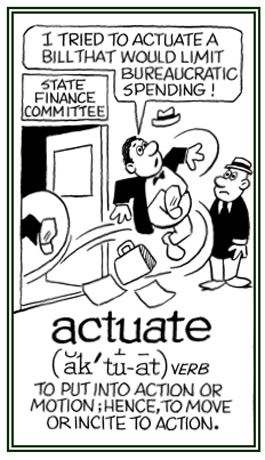ag-, agen-, act-, agi-, agit-
(Latin: to set in motion, to hurry, to shake; to drive; to do, to act; to lead, to conduct, to guide)
1. The state of progressing or achieving something: Mrs. Good suggested that her students take part in extracurricular activities after school, like in sports ,or playing in an orchestra or a band.
2. Energetic movement; liveliness: The degree of an individual's activity diminishes with increased age.
3. A specified pursuit in which a person partakes: An activity can be an educational process or procedure intended to stimulate learning through actual experience.
4. The ability to take part in a chemical reaction: The students watched catalytic activity take place during their chemistry class.
5. A physiological process: An activity can refer to a bodily function, such as a respiratory activity.
2. Energetic movement; liveliness: The degree of an individual's activity diminishes with increased age.
3. A specified pursuit in which a person partakes: An activity can be an educational process or procedure intended to stimulate learning through actual experience.
4. The ability to take part in a chemical reaction: The students watched catalytic activity take place during their chemistry class.
5. A physiological process: An activity can refer to a bodily function, such as a respiratory activity.
A recording instrument for indicating the movements of a person sleeping: When Jane complained about not sleeping well, her doctor suggested that an actograph could be used in order to find out more about her ailment.
1. A person or something that participates in some action: Originally in the 15th century an actor was an agent or a doer.
2. A person who acts and gets things done: Gary turned out to be a real actor in the peace movement.
3. A theatrical performer: Thomas was a very good actor and joined an excellent troupe of other actors for the town's production of one of Shakespeare's plays.
2. A person who acts and gets things done: Gary turned out to be a real actor in the peace movement.
3. A theatrical performer: Thomas was a very good actor and joined an excellent troupe of other actors for the town's production of one of Shakespeare's plays.
1. A woman, or girl, who acts in plays, movies, or television: In the 1930s, Shirley Temple was a celebrated child actress.
2. A woman or girl who pretends to be someone else: Ruth at school turned out to be a real actress, trying to assume by her conduct to be a very affluent person.
2. A woman or girl who pretends to be someone else: Ruth at school turned out to be a real actress, trying to assume by her conduct to be a very affluent person.
actual (adjective) (not comparable)
1. Concerning something that exists and is not merely potential or possible: Jack was told by the garage that the actual damages on his car would take at least a week to repair.
2. Regarding something that fits in to the distinctiveness of a type or group: Celia asked, "Is that person an actual doctor, or just a quack?"
3. Relating to something that is based on fact: Barbara presented an actual account of the accident just as it happened.
2. Regarding something that fits in to the distinctiveness of a type or group: Celia asked, "Is that person an actual doctor, or just a quack?"
3. Relating to something that is based on fact: Barbara presented an actual account of the accident just as it happened.
actually (adverb) (not comparable)
1. Concerning how a person expects the fact to be the opposite of that which is stated: Mrs. Thompson was surprised when Mary said, "No, I'm not a pharmacist, I'm actually a student learning how to be a pharmacist!"
2. Descriptive of how a person expresses wonder, surprise, or incredulity: Sam exclaimed,, "I actually won first place in the contest!"
3. Pertaining to how an opinion is expressed, often a contradictory one, or to change the subject: Martin mentioned, "Actually, I would prefer not to discuss this subject now."
2. Descriptive of how a person expresses wonder, surprise, or incredulity: Sam exclaimed,, "I actually won first place in the contest!"
3. Pertaining to how an opinion is expressed, often a contradictory one, or to change the subject: Martin mentioned, "Actually, I would prefer not to discuss this subject now."
A quality of being real or factual: Actualness can also be described as a condition of being genuine, real, or existent.
actuate (verb), actuates; actuated; actuating
1. To drive, to spark, to move to an action: After a rousing speech, the students were actuated to march and to demonstrate feelings against the university's increases in tuition costs.
2. To incite, to touch off, to inspire, or to provide an incentive to do something: After a long walk in the park, Peggy felt actuated to finish her term paper.
3. Etymology: from Medieval Latin actuare, "to act"; from Latin actus, past participle of the verb agere, "to do, to perform".

© ALL rights are reserved.

© ALL rights are reserved.
Go to this Word A Day Revisited Index
2. To incite, to touch off, to inspire, or to provide an incentive to do something: After a long walk in the park, Peggy felt actuated to finish her term paper.
3. Etymology: from Medieval Latin actuare, "to act"; from Latin actus, past participle of the verb agere, "to do, to perform".


Go to this Word A Day Revisited Index
so you can see more of Mickey Bach's cartoons.
Actum est. (Latin statement)
Translation: "It is done."
"It is over or finished."
1. A length in building which is about 120 Roman feet: An actus is about 35,5 meters.
2. In Roman law, the legality of herding animals or driving a vehicle across another person's land: A long time ago in Roman times, an actus allowed a farmer, for example, to drive his domesticated animals over his neighbor's property.
2. In Roman law, the legality of herding animals or driving a vehicle across another person's land: A long time ago in Roman times, an actus allowed a farmer, for example, to drive his domesticated animals over his neighbor's property.
An act of the court: Actus curia is a term used in law, and historically was one of many medieval councils of the courts of justice.
An act of God: More literally, actus Dei is a “driving” or the “moving forward of God”. Used in legal terminology, actus Dei refers to any phenomena, such as hurricanes, tornadoes, earthquakes, falling trees, hail storms, etc.
The greatest of all perplexities in theology has been to reconcile the infinite goodness of God with his omnipotence. Nothing puts a greater strain upon the faith of the common man than the existence of utterly irrational suffering in the universe.
A legal maxim: The act, Actus non facit reum nisi mens est rea, means that a person is not made a criminal unless the intention is criminal.
Pure act: Actus purus is Thomas Aquinas’ conception of God as pure act, without matter or form.
adrenoreactive (adjective), more adrenoreactive, most adrenoreactive
Referring to a reaction to catecholamines: An adrenoreactive response to the production of hormones by the adrenal glands in bodily processes might cause a negative effect on the heart rate, blood pressure, the way the body uses food, or some other vital function, possibly as a result of an ailment of the adrenal glands.


